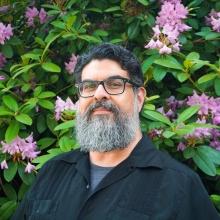Latin-American Philosophy12
Sep 26, 2013
It's National Hispanic Heritage Month, and this week on the program we'll be tackling Latin-American Philosophy. By Latin America we mean all the Spanish and Portuguese speaking parts of the Americas, including Mexico. We’ll just say American philosophy when we mean the U.S. and Canada, and apologize in advance for the somewhat arrogant terminology.
All philosophy in the Americas can be divided in two: that connected with the native American cultures that were here before Columbus, and what developed from the 16th century on. There’s a lot of rethinking going on about every aspect of pre-Columbian America: the population of the continent, and the complexity and sophistication of the cultures. But we’ll concentrate mainly on the later, post-Columbian period.
